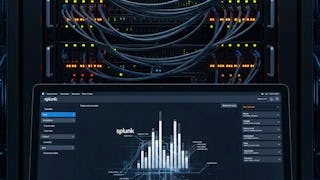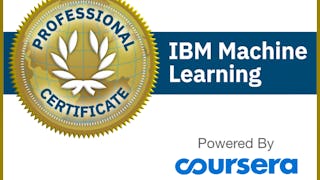- Browse
- Data Mining
Data Mining Courses
Data mining courses can help you learn data preprocessing, pattern recognition, and predictive modeling techniques. You can build skills in clustering, classification, and anomaly detection, that support extracting meaningful insights from large datasets. Many courses introduce tools like Python, R, and SQL, along with software such as RapidMiner and Weka, to help you apply these skills in real-world data analysis projects.
Popular Data Mining Courses and Certifications
 Status: Free TrialFree TrialV
Status: Free TrialFree TrialVVanderbilt University
Skills you'll gain: Generative AI Agents, Prompt Engineering, ChatGPT, Prompt Patterns, Generative AI, Agentic systems, Agentic Workflows, LLM Application, Productivity, Email Automation, AI Personalization, Make.com, AI Enablement, AI Workflows, OpenAI, Expense Management, Expense Reports, Large Language Modeling, Artificial Intelligence, Automation
4.8·Rating, 4.8 out of 5 stars8K reviewsBeginner · Specialization · 3 - 6 Months
 Status: Free TrialFree TrialV
Status: Free TrialFree TrialVVanderbilt University
Skills you'll gain: Prompt Engineering, ChatGPT, Prompt Patterns, Ideation, Verification And Validation, Data Presentation, LLM Application, Productivity, OpenAI, Generative AI, Document Management, Expense Reports, Responsible AI, AI Enablement, Creativity, Image Analysis, Large Language Modeling, Expense Management, Organizational Skills, Artificial Intelligence
4.8·Rating, 4.8 out of 5 stars8.6K reviewsBeginner · Specialization · 3 - 6 Months
 Status: Free TrialFree TrialR
Status: Free TrialFree TrialRRice University
Skills you'll gain: Statistical Hypothesis Testing, Microsoft Excel, Statistical Methods, Pivot Tables And Charts, Regression Analysis, Statistics, Descriptive Statistics, Probability & Statistics, Graphing, Spreadsheet Software, Probability Distribution, Business Analytics, Statistical Modeling, Statistical Analysis, Statistical Inference, Excel Formulas, Data Analysis, Data Presentation, Model Evaluation, Sample Size Determination
4.7·Rating, 4.7 out of 5 stars13K reviewsBeginner · Specialization · 3 - 6 Months
 Status: NewNewStatus: Free TrialFree TrialR
Status: NewNewStatus: Free TrialFree TrialRReal Madrid Graduate School Universidad Europea
Skills you'll gain: Data Literacy, Technical Communication, Probability & Statistics, Web Scraping, Data Import/Export, JSON, Statistical Analysis, Pandas (Python Package), Analytical Skills, Descriptive Statistics, Data Manipulation, Probability, Data Collection, Data Capture, Restful API, Performance Measurement, Data Cleansing, Application Programming Interface (API)
Beginner · Course · 1 - 4 Weeks
 Status: NewNewStatus: Free TrialFree Trial
Status: NewNewStatus: Free TrialFree TrialSkills you'll gain: Performance Tuning, Splunk, Role-Based Access Control (RBAC), Scripting, Servers, Security Controls, Data Pipelines, Application Performance Management, System Monitoring, Data Infrastructure, Windows Servers, Network Troubleshooting, Distributed Computing, Systems Administration, System Configuration, Data Management, Security Information and Event Management (SIEM), Configuration Management, Debugging, Performance Improvement
Beginner · Specialization · 3 - 6 Months
 Status: Free TrialFree Trial
Status: Free TrialFree TrialSkills you'll gain: Autoencoders, Exploratory Data Analysis, Unsupervised Learning, Supervised Learning, Feature Engineering, Generative AI, Classification Algorithms, Regression Analysis, Dimensionality Reduction, Time Series Analysis and Forecasting, Recurrent Neural Networks (RNNs), Convolutional Neural Networks, Reinforcement Learning, Generative Adversarial Networks (GANs), Artificial Intelligence and Machine Learning (AI/ML), Data Cleansing, Deep Learning, Data Science, Machine Learning, Python Programming
Build toward a degree
4.6·Rating, 4.6 out of 5 stars3.5K reviewsIntermediate · Professional Certificate · 3 - 6 Months
 Status: NewNewStatus: Free TrialFree Trial
Status: NewNewStatus: Free TrialFree TrialSkills you'll gain: Responsible AI, Decision Support Systems, Strategic Decision-Making, Operational Efficiency, Predictive Modeling, Process Optimization, Business Modeling, Predictive Analytics, Data-Driven Decision-Making, Data Pipelines, Business Intelligence, Data Ethics, Scenario Testing, Forecasting, Governance, Artificial Intelligence and Machine Learning (AI/ML), Data Visualization, Scikit Learn (Machine Learning Library), Python Programming, Regression Testing
Intermediate · Course · 1 - 4 Weeks
 Status: Free TrialFree Trial
Status: Free TrialFree TrialSkills you'll gain: Excel Formulas, Microsoft Excel, Data Cleansing, Spreadsheet Software, Data Validation, Data Analysis Software, Data Analysis, Statistical Analysis, Financial Analysis, Data Management
4.7·Rating, 4.7 out of 5 stars5.5K reviewsBeginner · Course · 1 - 4 Weeks
 Status: Free TrialFree TrialU
Status: Free TrialFree TrialUUniversity of California, Santa Cruz
Skills you'll gain: Bayesian Statistics, Time Series Analysis and Forecasting, Statistical Inference, Statistical Methods, R Programming, Forecasting, Probability & Statistics, Statistical Modeling, Technical Communication, Data Presentation, Probability, Statistics, Statistical Software, Probability Distribution, Statistical Analysis, Data Analysis, Markov Model, Model Evaluation, R (Software), Data Science
4.6·Rating, 4.6 out of 5 stars3.5K reviewsIntermediate · Specialization · 3 - 6 Months
 Status: NewNewStatus: Free TrialFree Trial
Status: NewNewStatus: Free TrialFree TrialSkills you'll gain: Exploratory Data Analysis, Logistic Regression, Supervised Learning, Applied Machine Learning, Model Evaluation, Data Modeling
Intermediate · Course · 1 - 3 Months
 Status: NewNewStatus: PreviewPreviewB
Status: NewNewStatus: PreviewPreviewBBoard Infinity
Skills you'll gain: Marketing Budgets, Stakeholder Engagement, Data-Driven Decision-Making, Marketing Effectiveness, Marketing Planning, Analytics, Data Presentation, Predictive Modeling, Trend Analysis, Presentations, Dashboard, Performance Reporting, Data Quality
Beginner · Course · 1 - 4 Weeks
 P
PPackt
Skills you'll gain: Alteryx, Spatial Analysis, Data Cleansing, Data Import/Export, Data Manipulation, Geographic Information Systems, Data Wrangling, Data Preprocessing, Data Integration, Data Transformation, Data Analysis, Microsoft Excel, Text Mining, Data Visualization Software, Excel Formulas
4.3·Rating, 4.3 out of 5 stars26 reviewsBeginner · Course · 3 - 6 Months
In summary, here are 10 of our most popular data mining courses
- ChatGPT: Excel at Personal Automation with GPTs, AI & Zapier: Vanderbilt University
- Generative AI Automation: Vanderbilt University
- Business Statistics and Analysis: Rice University
- Conceptos imprescindibles - Requisitos para el análisis : Real Madrid Graduate School Universidad Europea
- Splunk Administration & Performance Optimization Mastery: EDUCBA
- IBM Machine Learning: IBM
- Building and Optimizing Decision Systems: Edureka
- Problem Solving with Excel : PwC
- Bayesian Statistics: University of California, Santa Cruz
- Statistics You Need to Know for Machine Learning: SAS










